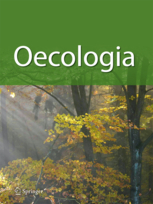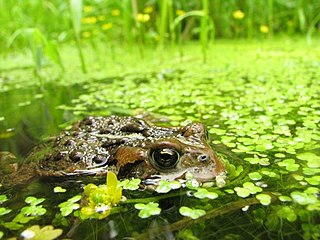
Ecology is the study of the relationships among living organisms, including humans, and their physical environment. Ecology considers organisms at the individual, population, community, ecosystem, and biosphere level. Ecology overlaps with the closely related sciences of biogeography, evolutionary biology, genetics, ethology, and natural history.

A herbivore is an animal anatomically and physiologically adapted to eating plant material, for example foliage or marine algae, for the main component of its diet. As a result of their plant diet, herbivorous animals typically have mouthparts adapted to rasping or grinding. Horses and other herbivores have wide flat teeth that are adapted to grinding grass, tree bark, and other tough plant material.
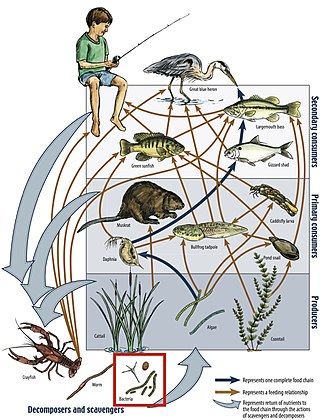
A food web is the natural interconnection of food chains and a graphical representation of what-eats-what in an ecological community. Another name for food web is consumer-resource system. Ecologists can broadly lump all life forms into one of two categories based on their trophic levels, the position it occupies in the food web: 1) the autotrophs, and 2) the heterotrophs. To maintain their bodies, grow, develop, and to reproduce, autotrophs produce organic matter from inorganic substances, including both minerals and gases such as carbon dioxide. These chemical reactions require energy, which mainly comes from the Sun and largely by photosynthesis, although a very small amount comes from bioelectrogenesis in wetlands, and mineral electron donors in hydrothermal vents and hot springs. These trophic levels are not binary, but form a gradient that includes complete autotrophs, which obtain their sole source of carbon from the atmosphere, mixotrophs, which are autotrophic organisms that partially obtain organic matter from sources other than the atmosphere, and complete heterotrophs that must feed to obtain organic matter.
Agroecology is an academic discipline that studies ecological processes applied to agricultural production systems. Bringing ecological principles to bear can suggest new management approaches in agroecosystems. The term can refer to a science, a movement, or an agricultural practice. Agroecologists study a variety of agroecosystems. The field of agroecology is not associated with any one particular method of farming, whether it be organic, regenerative, integrated, or industrial, intensive or extensive, although some use the name specifically for alternative agriculture.

Allelopathy is a biological phenomenon by which an organism produces one or more biochemicals that influence the germination, growth, survival, and reproduction of other organisms. These biochemicals are known as allelochemicals and can have beneficial or detrimental effects on the target organisms and the community. Allelopathy is often used narrowly to describe chemically-mediated competition between plants; however, it is sometimes defined more broadly as chemically-mediated competition between any type of organisms. Allelochemicals are a subset of secondary metabolites, which are not directly required for metabolism of the allelopathic organism.
Freshwater ecosystems are a subset of Earth's aquatic ecosystems. They include lakes, ponds, rivers, streams, springs, bogs, and wetlands. They can be contrasted with marine ecosystems, which have a larger salt content. Freshwater habitats can be classified by different factors, including temperature, light penetration, nutrients, and vegetation. There are three basic types of freshwater ecosystems: Lentic, lotic and wetlands. Freshwater ecosystems contain 41% of the world's known fish species.

Charles Sutherland Elton was an English zoologist and animal ecologist. He is associated with the development of population and community ecology, including studies of invasive organisms.
Ecology is a new science and considered as an important branch of biological science, having only become prominent during the second half of the 20th century. Ecological thought is derivative of established currents in philosophy, particularly from ethics and politics.

The soil food web is the community of organisms living all or part of their lives in the soil. It describes a complex living system in the soil and how it interacts with the environment, plants, and animals.
The Journal of Ecology is a bimonthly peer-reviewed scientific journal covering all aspects of the ecology of plants. It was established in 1913 and is published by Wiley-Blackwell on behalf of the British Ecological Society.
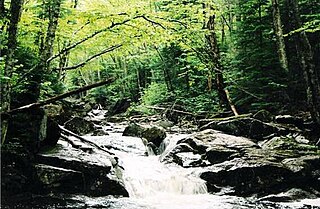
Ecosystem ecology is the integrated study of living (biotic) and non-living (abiotic) components of ecosystems and their interactions within an ecosystem framework. This science examines how ecosystems work and relates this to their components such as chemicals, bedrock, soil, plants, and animals.
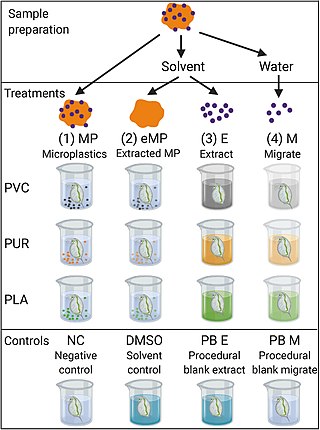
Ecotoxicology is the study of the effects of toxic chemicals on biological organisms, especially at the population, community, ecosystem, and biosphere levels. Ecotoxicology is a multidisciplinary field, which integrates toxicology and ecology.
The following outline is provided as an overview of and topical guide to ecology:

Seed predation, often referred to as granivory, is a type of plant-animal interaction in which granivores feed on the seeds of plants as a main or exclusive food source, in many cases leaving the seeds damaged and not viable. Granivores are found across many families of vertebrates as well as invertebrates ; thus, seed predation occurs in virtually all terrestrial ecosystems. Seed predation is commonly divided into two distinctive temporal categories, pre-dispersal and post-dispersal predation, which affect the fitness of the parental plant and the dispersed offspring, respectively. Mitigating pre- and post-dispersal predation may involve different strategies. To counter seed predation, plants have evolved both physical defenses and chemical defenses. However, as plants have evolved seed defenses, seed predators have adapted to plant defenses. Thus, many interesting examples of coevolution arise from this dynamic relationship.

In ecology, a community is a group or association of populations of two or more different species occupying the same geographical area at the same time, also known as a biocoenosis, biotic community, biological community, ecological community, or life assemblage. The term community has a variety of uses. In its simplest form it refers to groups of organisms in a specific place or time, for example, "the fish community of Lake Ontario before industrialization".

Canadian Science Publishing (CSP) is Canada's largest publisher of international scientific journals. It started in 1929 as the NRC Research Press, part of the National Research Council (NRC). In 2010, the organization spun off from NRC and was incorporated as a not-for-profit.
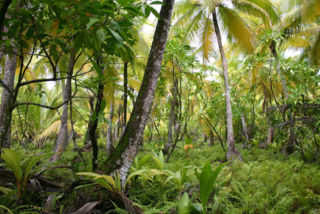
Plant ecology is a subdiscipline of ecology that studies the distribution and abundance of plants, the effects of environmental factors upon the abundance of plants, and the interactions among plants and between plants and other organisms. Examples of these are the distribution of temperate deciduous forests in North America, the effects of drought or flooding upon plant survival, and competition among desert plants for water, or effects of herds of grazing animals upon the composition of grasslands.
Joy K. Ward is a leading evolutionary biologist studying the impact of the environment on plants and ecosystems. She began a new role as the dean of the College of Arts & Sciences at Case Western Reserve University on July 1, 2020 - leaving behind her professorship at the University of Kansas. Her research on plant life has gained her notoriety in many scientific research fields. Aside from her work in the lab, she is also a strong advocate for advancing underrepresented communities' scientific learning and careers. As part of her deanship at the University of Kansas, Ward was an important factor in increasing the number of underrepresented individuals who held faculty positions in STEM subjects. Notably, as a result of her research efforts, she was awarded the Presidential Early Career Award for Scientists and Engineers by U.S. President Barack Obama.
Jeannine Cavender-Bares is a Distinguished McKnight University Professor at the University of Minnesota in the Department of Ecology, Evolution & Behavior. Her research integrates evolutionary biology, ecology, and physiology by studying the functional traits of plants, with a particular focus on oaks.

Anna Traveset is a Spanish ecologist, particularly known for her work on ecological interactions between plants and animals, especially on islands.
